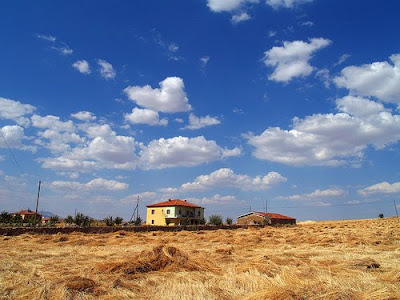According to the Köppen-Geiger Climate Classification Istanbul has a Csa climate. This means it has a warm temperate mediterranean climate with dry, warm summers and moderate, wet winters. The majority of Turkey shares this climate type with only the high mountains and plateaus having colder climates.

(Climates of Europe - Source: killacan.com)
As it has been stated before, water plays a critical role in the weather and climate of Istanbul. The city sits on two large bodies of water: the Black Sea and the Sea of Marmara. These seas obviously affect the precipitation of the region by supplying copious amounts of moisture in the air. But they also influence the temperature in the area because, as we all know, water heats and cools slower than land. This leads to a smaller temperature variance in the area and is a major reason why Istanbul enjoys such a temperate climate.

(Water front in Istanbul - Source: blacktomato.co.uk)
When looking at the history of Turkey as a whole there has been a general rise in average temperature. From 1971 to 2000 there was an overall rise of +0.64˚/100 year trend. There was a lot of fluctuation, as can be expected, but with a general increasing pattern.

(Temperature trend in Turkey - Source: Saylan, 2007)
There has also been a decrease in average precipitation and this is a major concern for the agriculture. Turkey is known for a number of cash crops like wheat, barley, cotton, and tobacco. These crops need a lot of moisture, particularly cotton and tobacco, and lower rain levels have been causing a number of problems. What is interesting is that while rainfall is decreasing there have been reports of higher evaporation. This could mean that increased solar radiation is causing water to evaporate but then that moist air is moving elsewhere so Turkey is drying out. This has lead to a very high demand for irrigation and the government has been heading several research projects to help maintain Turkey's ability to compete in the agricultural market. Some of these include ground water monitoring and water optimization through agricultural engineering.
(Wheat Field in Cappadocia, Turkey - Source: turkey-in-photos.com)
Sources:
http://www.weatheronline.co.uk/reports/climate/Turkey.htm
POTENTIAL IMPACTS OF CLIMATE CHANGE ON AGRICULTURE IN TURKEY by Levent Saylan, PhD.
CLIMATOLOGICAL APPLICATIONS IN TURKEY by Serhat Sensoy

No comments:
Post a Comment